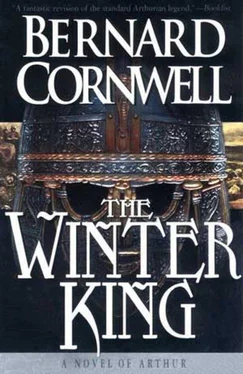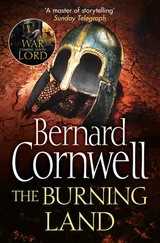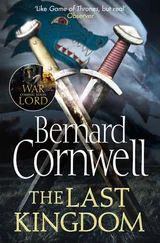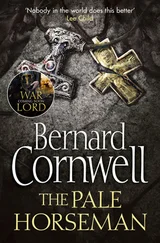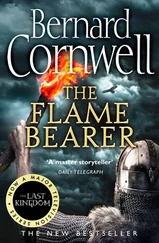“She is now.”
“You sound resentful! You think I should have gone to fetch her? My dear Derfel, I am quite busy enough without running around Britain after Nimue! If the girl can't cope with the Isle of the Dead then what earthly use is she?”
“She could have died,” I accused him, thinking of the ghouls and cannibals of the Isle.
“Of course she could! What's the point of an ordeal if there's no danger? You do have infantile ideas, Derfel.” Merlin shook his head pityingly, then slipped the Ring on to one of his long bony fingers. He stared solemnly at us, and we each waited awestruck for some manifestation of supernatural power, but after a few ominous seconds Merlin just laughed at our expressions. “I told you!” he said, 'the Treasures are nothing special."
“How many of the Treasures do you have?” Galahad asked.
“Several,” Merlin answered evasively, 'but even if I had twelve of the thirteen I would still be in trouble unless I could find the thirteenth. And that, Derfel, is the missing Treasure. The Cauldron of Clyddno Eiddyn. Without the Cauldron we are lost."
“We're lost anyway,” I said bitterly.
Merlin peered at me as though I was being particularly obtuse. “The war?” he said after a few seconds.
“Is that why you came here? To plead for peace! What fools the two of you are! Gorfyddyd doesn't want peace. The man's a brute. He has the brains of an ox and a not very clever ox at that. He wants to be High King, which means he has to rule Dumnonia.”
“He says he'll leave Mordred on the throne,” Galahad said.
“Of course he says that!” Merlin said scornfully. “What else would he say? But the minute he gets his hands on that wretched child's neck he'll wring it like a chicken, and a good thing too.”
“You want Gorfyddyd to win?” I asked, appalled.
He sighed. “Derfel, Derfel,” he said, 'you're so like Arthur. You think the world is simple, that good is good and bad is bad, that up is up and down is down. You ask what I want? I tell you what I want. I want the Thirteen Treasures, and I shall use them to bring the Gods back to Britain and then I shall command them to restore Britain to the blessed condition it enjoyed before the Romans came. No more Christians' he pointed a finger at Galahad 'and no Mithraists either' he pointed at me 'just the people of the Gods in the country of the Gods. That, Derfel, is what I want."
“Then what of Arthur?” I asked.
“What of him? He's a man, he's got a sword, he can look after himself. Fate is inexorable, Derfel. If fate means Arthur to win this war then it doesn't matter if Gorfyddyd masses the armies of the world against him. If I had nothing better to do then I confess I would help Arthur, because I like him, but fate has decreed that I am an old man, increasingly feeble and possessed of a bladder like a leaking waters king and I must therefore husband my waning energies.” He proclaimed this pathetic state in a vigorous tone.
“Even I cannot win Arthur's wars, heal Nimue's mind and discover the Treasures all at the same time. Of course, if I find that saving Arthur's life helps me find the Treasures, then be assured I shall come to the battle. But otherwise?” He shrugged, as though the war was of no importance to him. Nor, I suppose, was it. He turned to the small window and peered at the three stakes that had been erected in the compound. “You'll stay to see the formalities, I hope?”
“Should we?” I asked.
“Of course you should, if Gorfyddyd allows you. All experience is useful, however ugly. I've performed the rites often enough, so I won't stay to be amused, but be assured you will be safe here. I shall turn Gorfyddyd into a slug if he touches a hair of your foolish heads, but for now I have to go. lorweth thinks there's an old woman on the Demetian border who might remember something useful. If she's alive, of course, and kept her memory. I do hate talking to old women; they're so grateful for company that they never stop chattering and never keep to the subject either. What a prospect. Tell Nimue I look forward to seeing her!” And with those words he was out of the door and striding across the fort's inner compound.
The sky clouded that afternoon and a grey ugly drizzle soaked the fort before evening. The Druid lorweth came to us and assured us we were safe, but tactfully suggested that we would strain Gorfyddyd's reluctant hospitality if we attended the evening's feast that marked the last gathering of Gorfyddyd's allies and chiefs before the men at Caer Sws marched south to join the rest of the army at Branogenium. We assured lorweth we had no wish to attend the feast. The Druid smiled his thanks, then sat on a bench beside the door. “You're friends of Merlin?” he asked.
“Lord Derfel is,” Galahad said. lorweth rubbed his eyes tiredly. He was old, with a friendly, mild face and a bald head on which a ghost of a tonsure showed just above each ear. “I cannot help thinking,” he said, 'that my brother Merlin expects too much of the Gods. He believes the world can be made anew and that history can be rubbed out like a line drawn in the mud. Yet it isn't so.“ He scratched at a louse in his beard, then looked at Galahad, who wore a cross about his neck. He shook his head. ”I envy your Christian God. He is three and He is one, He is dead and He is alive, He is everywhere and He is nowhere, and He demands that you worship Him, but claims nothing else is worthy of worship. There's room in those contradictions for a man to believe in anything or nothing, but not with our Gods. They are like kings, fickle and powerful, and if they want to forget us, they do. It doesn't matter what we believe, only what they want. Our spells only work when the Gods permit. Merlin disagrees, of course. He thinks that if we shout loud enough we'll get their attention, but what do you do to a child who shouts?"
“Give it attention?” I suggested.
“You hit it, Lord Derfel,” lorweth said. “You hit it until it is quiet. I fear Lord Merlin may shout too loud for too long.” He stood and picked up his staff. “I apologize that you cannot eat with the warriors tonight, but the Princess Helledd says you are very welcome to dine with her household.” Helledd of Elmet was the wife of Cuneglas and her invitation was not necessarily a compliment. Indeed, the invitation could have been a measured insult devised by Gorfyddyd to imply that we were only fit to dine with women and children, but Galahad said we would be honoured to accept. And there, in Helledd's small hall, was Ceinwyn. I had wanted to see her again, I had wanted it ever since Galahad had first ventured the suggestion that he make an embassy to Powys, and that was why I had made such strenuous efforts to accompany him. I had not come to Caer Sws to make peace, but to see Ceinwyn's face again, and now, in the flickering rushlight of Helledd's hall, I saw her. The years had not changed her. Her face was as sweet, her manner as demure, her hair as bright and her smile as lovely. When we entered the room she was fussing with a small child, trying to feed him scraps of apple. The child was Cuneglas's son, Perddel. “I've told him if he won't eat his apple then the horrid Dumnonians will take him away,” she said with a smile. “I think he must want to go with you, for he won't eat a thing.”
Helledd of Elmet, Perddel's mother, was a tall woman with a heavy jaw and pale eyes. She made us welcome, ordering a maidservant to pour us mead, then introduced us to two of her aunts, Tonwyn and Elsel, who looked at us resentfully. We had evidently interrupted a conversation they were relishing and the aunts' sour glances suggested we should leave, but Helledd was more gracious. “Do you know the Princess Ceinwyn?” she asked us.
Galahad bowed to her, then squatted beside Perddel. He always liked children who, in turn, trusted him on sight. Before a moment had passed the two Princes were playing with the apple scraps as though they were foxes, with Perddel's mouth the foxes' den and Galahad's fingers the hounds chasing the fox. The pieces of apple disappeared. “Why didn't I think of that?” Ceinwyn asked.
Читать дальше
